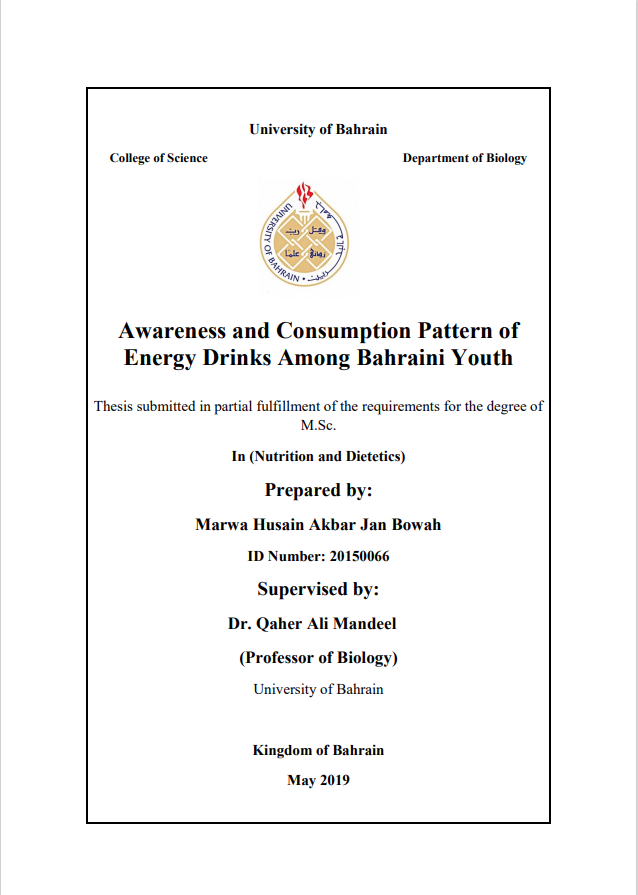Identifier
https://digitalrepository.uob.edu.bh/id/15249aaa-91d4-4aa6-a3f3-b0fe5c6e75b1
https://digitalrepository.uob.edu.bh/id/15249aaa-91d4-4aa6-a3f3-b0fe5c6e75b1
Awareness and Consumption Pattern of Energy Drinks Among Bahraini Youth
Linked Agent
Mandeel, Qaher Ali , Thesis advisor
Language
English
Extent
[1], 13, 116, [2], 4, [12] pages
Place of institution
Sakhir, Bahrain
Thesis Type
Thesis (Master)
Institution
University of Bahrain, College of Science, Department of Biology
Description
ABSTRACT:
Energy drinks have become more popular in recent years, especially among the youth. The study aims to investigate the consumption pattern and awareness of energy drinks among Bahraini youth from the ages of 15 through 24 years old. The cross-sectional study was conducted on randomly selected 728 participants consisting of 301 males and 427 females from the local Bahraini population. Data collection was conducted using questionnaire surveys distributed via WhatsApp application. The study results revealed that 16% of respondents were energy drink consumers, 14% had previously consumed them but currently stopped and the majority (70%) had never consumed energy drinks. Reasons for not consuming or stopped consuming were that consumers had heard or read about the harmful consequences of drinking energy drinks(38.20%), no particular reason (21.90%), or did not prefer the taste (16.98%), with the remaining reasons being marginal. The reasons given for consuming energy drinks were decreasing fatigue (24.4%), keeping alert (20.8%), enhancing performance, i.e. studying/working (11.8%), and enjoyment/fun (11.3%). About 47.9% of the surveyed consumers had consumed energy drinks on a weekly basis during the past 12 months, while 32.5% and 19.7% had consumed them on a monthly and daily basis, respectively. The main reasons participants were introduced to energy drinks includedfamily or friends’ recommendation (54.7%), commercial advertisements (15.4%) and aggressive marketing of these products (13.7%). Factors that influenced the choice of energy drinks among consumers were taste (41.6%), price (18.0%), and reputation and popularity (10.1%). Consumer opinion regarding consumption and the effects of social environment on them were also investigated. In terms of common adverse/withdrawal effect of energy drinks that consumers experienced, 13.0% reported no adverse or withdrawal effects, while 11.6% experienced an increase heart rate. Male participants consumed energy drinks (52.1%) more than their female counterparts (47.9%), The results also revealed that consumers, especially female, had the highest level of BMI. Significant factors that influenced energy drink consumption were the perception that they cause heart problems and sleep disturbances. Moreover, the perception that energy drinks symbolizes fashion and an active youth lifestyle and the knowledge of the age in which energy drinks are prohibited, age and education were other indicators. Awareness level of the studied sample was (48%) with no significant mean difference in the awareness level due to energy consumption. In conclusion, improving youth nutrition knowledge alone is not enough, but it should be reinforced with setting rules and regulations.
Energy drinks have become more popular in recent years, especially among the youth. The study aims to investigate the consumption pattern and awareness of energy drinks among Bahraini youth from the ages of 15 through 24 years old. The cross-sectional study was conducted on randomly selected 728 participants consisting of 301 males and 427 females from the local Bahraini population. Data collection was conducted using questionnaire surveys distributed via WhatsApp application. The study results revealed that 16% of respondents were energy drink consumers, 14% had previously consumed them but currently stopped and the majority (70%) had never consumed energy drinks. Reasons for not consuming or stopped consuming were that consumers had heard or read about the harmful consequences of drinking energy drinks(38.20%), no particular reason (21.90%), or did not prefer the taste (16.98%), with the remaining reasons being marginal. The reasons given for consuming energy drinks were decreasing fatigue (24.4%), keeping alert (20.8%), enhancing performance, i.e. studying/working (11.8%), and enjoyment/fun (11.3%). About 47.9% of the surveyed consumers had consumed energy drinks on a weekly basis during the past 12 months, while 32.5% and 19.7% had consumed them on a monthly and daily basis, respectively. The main reasons participants were introduced to energy drinks includedfamily or friends’ recommendation (54.7%), commercial advertisements (15.4%) and aggressive marketing of these products (13.7%). Factors that influenced the choice of energy drinks among consumers were taste (41.6%), price (18.0%), and reputation and popularity (10.1%). Consumer opinion regarding consumption and the effects of social environment on them were also investigated. In terms of common adverse/withdrawal effect of energy drinks that consumers experienced, 13.0% reported no adverse or withdrawal effects, while 11.6% experienced an increase heart rate. Male participants consumed energy drinks (52.1%) more than their female counterparts (47.9%), The results also revealed that consumers, especially female, had the highest level of BMI. Significant factors that influenced energy drink consumption were the perception that they cause heart problems and sleep disturbances. Moreover, the perception that energy drinks symbolizes fashion and an active youth lifestyle and the knowledge of the age in which energy drinks are prohibited, age and education were other indicators. Awareness level of the studied sample was (48%) with no significant mean difference in the awareness level due to energy consumption. In conclusion, improving youth nutrition knowledge alone is not enough, but it should be reinforced with setting rules and regulations.
Member of
Category
Theses

